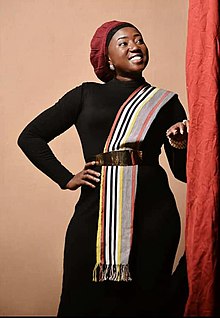|
Malika Ouattara
Malika Ouattara (born 16 April 1993) is a slam poet and musical artist from Burkina Faso, known as "Malika la Slameuse". BiographyOuattara was born on 16 April 1993 in Ouagadougou in Burkina Faso.[1] She made her performance debut at the Waga Hip Hip Festival in 2009.[2] Her lyrical talent, as well as her presence as a woman on the predominately male slam scene, meant that she became a leading figure in slam in West Africa.[2] In 2017 Outtara estimated that there were only fifteen African women slam poets in total.[3] She released her first single in 2012, which was part of a project run by the Ministry for Women.[4] In 2013 she made her first television appearances.[4] In 2016 she was photographed by Leila Alaoui, as part of a series focusing on women's empowerment in Burkina Faso.[5] The same year, and postponed by the terrorist attack in which Alaoui was killed, Ouattara released her first album, entitled Slamazone.[4] The album sold more than 5000 copies.[3] Artists who collaborated with Ouattara on it include: Smarty, Greg Burkimbila, Will Be Black and Wendyida.[6] Her music and poetry are socially conscious and feature themes of love, as well as women's rights issues such as unplanned pregnancy.[7] In her single "All Night" she discusses unfaithfulness in relationships.[8] She has won numerous slam awards in West Africa.[9] In June 2015 she took part in a week to raise awareness of issues facing people with albinism in her country.[10]  In 2019 she set up the Slamazone Foundation of which she is President, in order to fund raise for social issues in her country.[11] However the charity had to reprioritise its work in the face of the COVID-19 pandemic; their focus moved to virus prevention through the promotion of good hygiene.[12] In her previous career she worked for the African Institute of Management.[13] On 10 September 2020, Ouattara encouraged as many of her fanclub as possible to donate blood.[14] She also signed a memorandum of understanding between the Slamazone Foundation and the National Blood Transfusion Centre in Ouagadougou.[14] Outtara is a practising Muslim.[15] She has received criticism from some members of the public who believe that Muslim women should not perform in public.[1] She has publicly stated that her faith and her art do not contradict each other.[15] References
External links
Information related to Malika Ouattara |
||||||||||||||||
